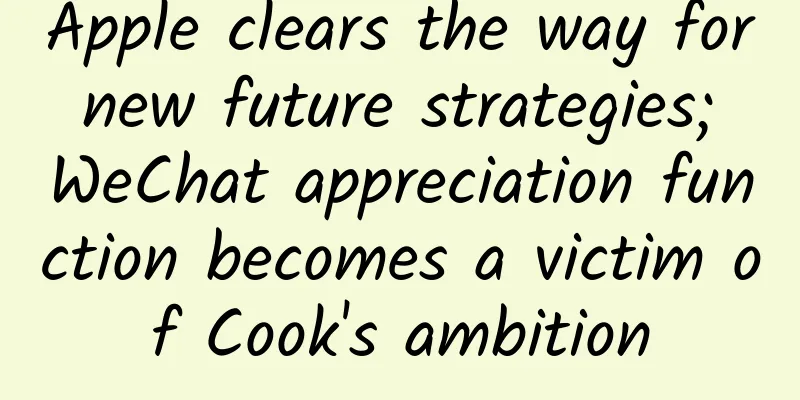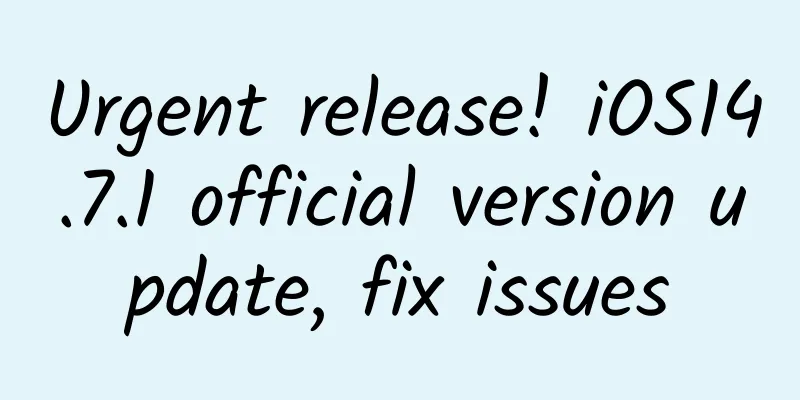Apple clears the way for new future strategies; WeChat appreciation function becomes a victim of Cook's ambition

|
Recently, the Tencent WeChat team helped Apple update the 3.1.1 clause of the App Store application development terms, which strictly requires that apps should not contain buttons, external links or other calls to action that guide customers to use non-IAP mechanisms to make purchases. Therefore, WeChat chose to make the current adjustment to the WeChat appreciation function on the iOS version. Starting from 17:00 on April 19, the WeChat public platform app appreciation function for iOS will be closed. iOS users can transfer money to public accounts via QR codes, while other WeChat app appreciation functions such as Android will not be affected. Then, in the early hours of yesterday morning, the WeChat team issued another notice, saying that personal transfers for articles on the iOS WeChat public platform that went online in the afternoon of the 19th would be urgently closed. Is the reward function considered as virtual payment? As soon as this incident happened, many viewers were angry about Apple's brutality. However, the core of this matter is mainly reflected in the definition of in-app purchases. According to the App Store's operating rules, consumption behaviors of redeeming virtual items and services within the application must be completed through the App Store's transaction channels, while the WeChat public account's appreciation function circumvents this explicit regulation. According to Apple's developer terms, this reason is obviously far-fetched, because the praise function can only unlock the user's avatar, but it cannot unlock any substantial content. And the essence of praise for articles is that the content produced by the author brings pleasure to the readers, so the readers hope to reward the author with money. Therefore, the act of appreciating an article does not count as a purchase in the App Store, and the user's appreciating behavior cannot bring any benefits to the user. The user only appreciates the author's article because he thinks it is well-written, inspires him, and allows him to learn something. The user's appreciation is actually an expression of encouragement and support for the author. The appreciation here can actually be understood as a donation, which is completely voluntary and well-intentioned, which is exactly the same as the street tipping. Therefore, Apple's move is really too arrogant and unreasonable. Game of rules or differences of interests? As we all know, Apple has been sharing profits through the IAP mechanism and making profits from App Store payments. According to Apple's rules, Apple gets 30% of the sales revenue of all apps released by third-party developers. Developers get the remaining 70%. If the author of a WeChat public account is rewarded 100 yuan, Apple will take 30 yuan, and the author can only get 70 yuan. If 30% of the reward amount is taken as profit sharing, it is obviously unacceptable for WeChat. This not only reduces the income of a certain channel for self-media, but also loses the right to directly interact with users. For the WeChat platform, it not only impacts the social system of WeChat public accounts, but also touches Tencent's bottom line. On the surface, this is just a game about platform rules, but behind it is the difference of interests between WeChat and Apple. The value of third-party mobile payments in China increased threefold in 2016, and this huge market was divided between WeChat and Alipay. Apple Pay's share of the US mobile payment market also continued to rise. Coupled with the invincibility of Apple products in China, Apple is also confident that it wants to get a piece of the pie in China's mobile payment field. Banning the iOS WeChat Rewards feature is just Cook’s first step On February 8 last year, Apple Pay was officially launched in China, but the result was not what was expected. Whether it was the unanimous praise from word of mouth or the hard work of major banks in the early stage of entering China, the poor data made Apple Pay a little embarrassing, and such data did not satisfy Cook. As the helmsman of Apple after Jobs, the reason why Cook was able to take over the position of Help is largely because he is more profitable. However, the failure of Apple Pay made Cook realize that if he wanted to succeed in the field of mobile payment in China, he had to beat WeChat and Alipay. So under this circumstance, banning the WeChat reward function is a natural thing. However, this is only Apple’s first step. In addition to making money, Apple’s approach is also to cultivate users’ payment habits. Because when users are accustomed to using Apple’s own payment channels online, they will be more inclined to use Apple Pay offline. Faced with Apple's arrogance, WeChat was honest. Since you want to charge money, I don't want this function! Everyone parted ways, and neither side seemed to have suffered any loss. The authors of WeChat public accounts suffered the most. According to data, although there are not many authors who rely on rewards for public account articles, some of them still make a lot of money, and it is common for an article to be rewarded with tens of thousands of yuan. The most famous one is the WeChat article "Luo Yixiao, stop right there" at the end of last year, which raised millions of dollars. Although Tencent later announced that the WeChat praise function could not be used for fundraising and returned the donations, it also made everyone realize the prospect of WeChat fundraising. If WeChat cooperates with some public welfare organizations and guides them, WeChat praise can be a convenient channel for charitable donations. If this continues, I believe that WeChat's experience is definitely not an isolated case, and the reward function is not unique to WeChat. For example, Toutiao, which we are using, has a reward function, and Weibo and Zhihu also support rewards. Currently, Weibo article rewards can still be paid through Alipay channels, so will Apple's next target be another domestic Internet giant, Alibaba? What's Cook's next move? Apple’s ban on WeChat’s reward function is really a ulterior motive. In fact, its fundamental purpose is to gain the right to speak in mobile payment. So the means to target WeChat and even Alipay are definitely not as simple as restricting the reward function. At present, Apple has not yet taken a commission on physical commodity transactions, which means that we don’t need to pay Apple extra money when we usually shop on Taobao online or scan offline. However, with Apple’s strong control over the iOS system platform, even if it will not take a commission on physical commodity transactions in the future, it can use many methods to limit the application of WeChat and Alipay in mobile payment scenarios. This is something that Tencent and Alibaba must be vigilant about. Recently, a senior executive of Tencent also wrote about this incident, saying that he has been using Apple for so long that he now plans to buy an Android phone. Apparently, Tencent is also very dissatisfied with Apple's approach. This may lead to differences in the experience between WeChat on the iOS platform and WeChat on the Android platform in the future. For example, some WeChat public account articles can be set to be visible only to Android phones, because Apple users cannot pay, so there is naturally no need for them to see them. Although this approach is more extreme, it is not impossible. Who knows, in the future, payment-related functions in WeChat may only be experienced by Android phones. Some people say that Facebook, Twitter, and Youtube are all doing well on the iOS platform, so why hasn't Apple banned the functions of these apps? This is because both Facebook and Twitter are purely social apps. Foreign users don't use Facebook to scan and pay, nor do they use Twitter to order takeout. For foreign Apple phone users, the only payment methods are Apple's AppStore and Apple Pay. Facebook and Twitter do not touch Apple's core interests, so everyone is naturally at peace. Not long ago, two foreign guys experienced cashless living in Hangzhou. They could solve all their problems with mobile phone payments in one day. This kind of experience cannot be achieved even in the United States, the hometown of Apple. However, as a Chinese mobile phone user, even though it looks great to use Apple Pay to eat breakfast at Starbucks, I think the pancakes bought on the roadside by scanning with WeChat are more delicious! As a winner of Toutiao's Qingyun Plan and Baijiahao's Bai+ Plan, the 2019 Baidu Digital Author of the Year, the Baijiahao's Most Popular Author in the Technology Field, the 2019 Sogou Technology and Culture Author, and the 2021 Baijiahao Quarterly Influential Creator, he has won many awards, including the 2013 Sohu Best Industry Media Person, the 2015 China New Media Entrepreneurship Competition Beijing Third Place, the 2015 Guangmang Experience Award, the 2015 China New Media Entrepreneurship Competition Finals Third Place, and the 2018 Baidu Dynamic Annual Powerful Celebrity. |
<<: Still not spacious enough? The new Ghost will be longer
>>: Ruifeng S3 road test spy photos exposed with longer body size and upgraded power system
Recommend
How to plan a high-quality operational activity plan?
1. Tell a story first Let's assume a scenario...
Scientists, we want to tell you: 50th anniversary exhibition of China's overcoming the difficulties of hybrid rice
In 2023, it will be the 50th anniversary of China...
Shooting short videos and making vlogs is the easiest side job for office workers to succeed
A while ago, a friend called me and said he wante...
Tips for building a user operation membership system!
The systematized process standards were also ment...
GSMA: China's 5G vertical industry application cases in 2022
2021 is a critical year for 5G to achieve initial...
Marine mammals harbor seal
When it comes to harbor seals, do you naturally t...
"I am willing to dedicate my life to the country!" He has been working incognito for 17 years for the nuclear industry of his motherland, and now he is still young after returning from his 70s
May 28 He is an academician of the Chinese Academ...
"59 types of coffee were found to contain carcinogens", so coffee can no longer be drunk safely? The truth is →
Recently, the topic #59 types of coffee all found...
A complete guide to Tik Tok, from beginner to master!
This article has a total of 13,000 words, and it ...
Marketing campaign self-checklist!
Events have become one of the most effective ways...
Vehicles brake by friction, what do ships brake by?
Braking devices are essential for the safe drivin...
Xiaohongshu KOL distribution model and content marketing methodology
We provide you with a practical summary of brand ...
If you want users to click on your ads, try these 5 methods!
We have to admit that we live in an age where adv...
7 content models for corporate TikTok accounts
What is the most popular social short video platf...
Educational products use private domain traffic techniques!
When we operate educational products, there is no...



![[Smart Farmers] How to remove the bitterness of cucumbers? Genomics can help](/upload/images/67f23aca05ee1.webp)





